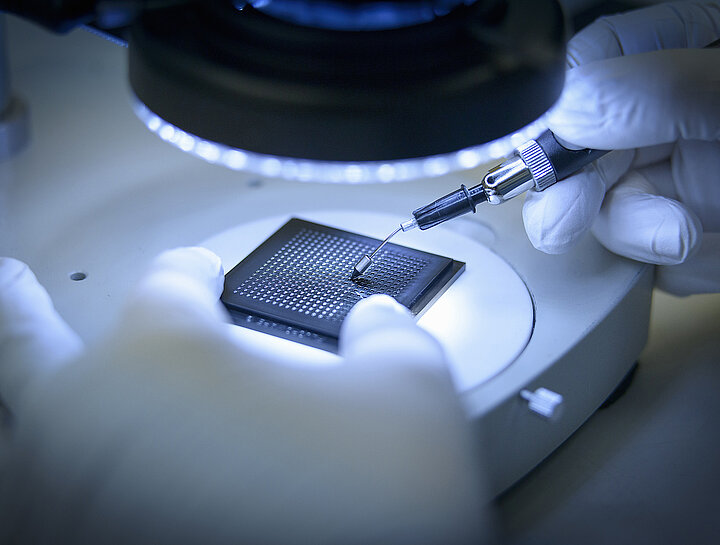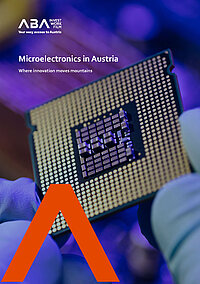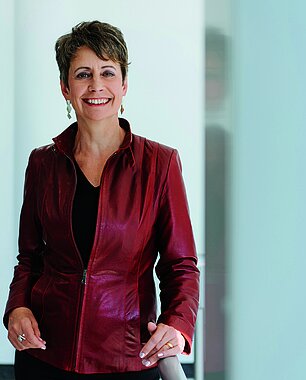
Microelectronics
World-class ecosystem for microelectronics: In large corporations with intensive research activities network with technology parks, universities and universities of applied sciences in Austria.
Contact us
Microelectronics: Key technology
from Austria
Artificial intelligence is undoubtedly one of the most important terms for technology of the present and the future. The electronics industry plays a central role in effective functioning of AI-based systems, as it provides the necessary highly developed hardware.
This is based on advanced micro- and nanoelectronics, which are an integral part of a wide range of technical components and assemblies. These components, known as Microelectronics, are the heart of today’s technology world and are a product of the advanced capacities and innovations in the electronics industry.
If there is one industrial sector that has sustainably changed our world over the last few decades, it is microelectronics. These Electronic-based systems are an integral part of our everyday lives, whether at work or in our private lives. Many people do not realise that microelectronics developed and frequently produced in Austria as well are found in just about every modern car, smart phone or passport.
Approx. 63,000 people in close to 200 companies are employed in the Austrian electronics industry. microelectronics is one of the most important sectors in Austria. Large research-intensive corporations are linked to technology parks, universities and universities of applied science to create a world-class ecosystem for microelectronic innovations.
Downloads
Find here worth knowing and useful information about Austria as a business location easily to download.
The role of the electronics industry in the development of future-oriented technologies
The electronics industry is a key driver for future-oriented technologies such as automated driving, the Internet of Things and Industry 4.0.
The use of electronic-based systems, which are developed and manufactured by the electronics industry, is essential for the implementation of these technologies. The use of artificial intelligence, which can perceive its environment via sensors, is particularly important for the development of sustainable and user-friendly technologies. These sensors and the associated control software are based on advanced micro- and nanoelectronics, a speciality of the electronics industry.
Microelectronics in Austria:
Five reasons to locate your company here
- 01
Connecting software and hardware
Austria's strength lies not only in the design and production of integrated circuits. These circuits are also combined with specific software and embedded in electronic devices and systems. This is what makes electronic products intelligent to begin with.
- 02
Close collaboration between industry and research
Innovation and growth require excellent research. Silicon Austria Labs also carries out focused top-level research in addition to Joanneum Research Robotics and Fraunhofer Austria. The Austrian Institute of Technology brings industry and science together and takes electronic-based systems to completely new levels.
- 03
Outstanding talents
Application-oriented implementation of the research results, highly qualified graduatesqualified graduates () from technical colleges and universities, the linking of numerous national clusters (e.g., Silicon Alps) combine to make Austria a unique environment for new technologies and putting trends such as autonomous driving, Industry 4.0 and the Internet of Things into practice.
- 04
Innovative flagship companies
Multinationals such as Infineon, Intel, flex, CISC Semiconductor and LAM Research have a strong foundation in Austria. They make important contributions on the world stage in cooperation with local companies. One key milestone took place when Intel, the world's largest semiconductor company, set up business operations in Villach and Linz. However, not only global players but microelectronic startups have also selected Austria as their home base.
- 05
Strong location for technology and research
Together with France, Italy, Germany and the United Kingdom, Austria is also active in the "Important Project of Common European Interest" (IPCEI) on microelectronics. In addition, the country is planning to participate in the second project, IPCEI Microelectronics II, under the motto "Safety, Security, Sustainability and Sovereignty.” It involves a total investment volume of € 8.4 billion and serves as an important tool for strengthening Austria as a business location and in combating the climate crisis.
Austria is also an important research location in the electronics industry. For example, Graz University of Technology has set up an EBS Center, an innovation cluster in which various EBS are researched, such as microelectronics and sensors. Cooperation is also maintained with non-university research institutionsresearch institutions (), small and medium-sized enterprises and start-upsstart-ups ().
Another facility of TU Graz is the Silicon Austria Labs (SAL). This is a research initiative that primarily focuses on how the value chain of EBS can be optimised. In the area of research funding, the Austrian Research Promotion Agency (FFG) offers a qualification program called InnoEBS. Austrian electronics companies can take advantage of this to offer their employees the opportunity to be trained as certified EBS specialists.
The electronics industry as a driver of research
In the electronics industry, there is a strong focus on the research and development of Electronic Bases Systems (EBS), with two main areas emerging:
technology-oriented and user-oriented research. Technology-oriented research serves as the basis for application-oriented innovations. In the electronics industry, technology-oriented research includes the following aspects:
- Materials science and materials engineering: The main focus here is on the question of which materials and raw materials the components are made from and how these can be obtained and recycled.
- Embedded systems: These are systems consisting of hardware and software that form a component of another system.
- High-frequency technology: This subarea deals with transmitter-receiver communication, as well as the contactless identification and localisation of devices and receiver modules.
- Sensor technology: The further development of sensors and new production processes are researched.
User-oriented research in the electronics industry, which covers both private and professional applications, includes:
- MobilityMobility (): This relates to the use of EBS in the area of infrastructure, as well as the development of driver assistance systems and research into automated driving.
- ICT: This refers to the area of information and communication.
- Production: This area deals with how EBS can be used in future production facilities.
- Energy efficiency: This is where research is carried out into how devices can be operated more energy-efficiently and how the use of renewable energies can be utilised.
- Ambient Assistent Living: Refers to the research and development of technologies that can make everyday life easier for senior citizens.
Success Stories
Our services
We simply get it done – for you!
Do you operate in the area of electronic-based systems? Are you looking for the perfect location and valuable partners for your company?
Then you have come to the right place in Austria!
Downloads
Where Innovation moves mountains


